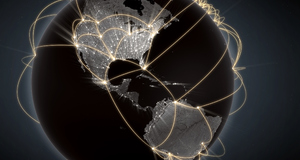Globalization and the State: Assessing the Decline of the Westphalian State in a Globalizing World
By
2017, Vol. 9 No. 03 | pg. 2/2 | « Future Projections and the North-South DiscordGlobalization is a complex phenomenon in itself; the best scholars in the world have yet been unable to agree on a precise definition of the term. Anticipating the future projections of such a phenomenon is a daunting task to be sure. Considering the present scenario one can perhaps make three broad assumptions of where globalization is possibly headed in the future. The first projection involves a ‘pitcher plant’ model of the future. The advanced countries constituting the global North present a seemingly attractive vision of the world through rose tinted glasses. Adopting means that are overt (IMF conditionalities or threat of sanctions) or covert (free and fair international trade or support for human rights), they may lure in underdeveloped and developing nations of the global South persuading them to allow further access of their economies and societies. However, the ultimate objective of the North is to further its profits and cement its economic dominance over the world. The growth and development of the South is not of significant concern to it. The economies of the South, unless able to break out and establish themselves as economic powers themselves, may end up being completely dissolved into the global economic net controlled by the North, much like how the pitcher plant lures in unsuspecting prey and dissolves them. The figures presented in the following table present a clear picture: the North wants the South to open its markets, yet the strongest economies of the world have some of the highest average tariff duties, preventing the South from gaining access to their markets.Comparison of Average Tariff Duties between Northern and Southern economies
Goods and services from the North flow to and entrench themselves into the economies of less developed and developing nations. It is possible that in the future, the neo-imperialist intentions of the North may manifest so successfully that they gain absolute power to shape the economies of smaller nations. International monetary institutions may likely assist in this as they already face severe criticism for bias towards the larger economies. In such a scenario, a nation may end up framing their economic policies as per the wishes of their neo-imperialist masters. Sovereignty is thus, reduced to an ornament, for a nation without control of its economy cannot claim to be sovereign. A second projection could present a scenario where the South successfully breaks free of the grim picture painted by the pitcher plant model. Such a projection assumes the economic power centre of the world shifting from West to East, with countries like China and India emerging as major economic powerhouses. Both countries have been projected to overtake the US economy in a few decades, however the US and Europe continue to remain economic powers in themselves. In this scenario, sovereignty is, to some degree, retained by the South. The alternative offered to the South may just draw them away from the advanced North and attract them to nations closer to them. In one sense political alliances in Asia have already begun changing with former American strongholds like Pakistan and the Philippines forging close ties with China. This projection has a number of obstacles. The most conspicuous one being that there is very little cooperation among major eastern economic powers. There are bitter conflicts of interest between China and India, and between China and some South East Asian nations. Additionally, several scholars also predict that transitional countries like China, India and Brazil will be unable to develop their societies in the same way as Japan and South Korea (Hirst and Thompson, 1999) and therefore unable to assume to position that the European countries and the USA currently enjoy. There is also the danger that sovereignty may still be compromised, just that instead of the North, it will be superpowers within the South. The third and final projection presupposes the development of a hybrid state, where the domestic economy is largely infused with and functions within the global economic network. This scenario assumes that the South is able to develop itself to some degree and is able to follow an economic agenda for its own interest and not that of the North, either through diplomacy or by coming together as a conglomeration to pool power, resources and markets. This projection may be considered idealistic, but it is important to keep in mind that the North is not as united as would seem and there are considerable altercations among them. Additionally they are also bound by jus cogens obligations. All of this may allow the South to bargain a better deal for themself. It has also been seen, in the case of the Association of South East Asian Nations (ASEAN) that smaller countries do have the capability to come together and establish conglomerations and free markets even outside Europe and North America. Sovereignty in this projection remains the safest with all countries retaining a nominal degree of control over their policies and agendas. ConclusionThe world has come a long way since the Treaty of Westphalia. The rise of globalization has been a relatively recent trend and the effects have not yet had time to fully play out. All study and discussion about this topic bears a cloud of uncertainty and presumption about it. We have looked at some of the trends and effects of globalization that have taken place so far, and have discussed instances of where and how Westphalian sovereignty has been compromised, and where it has not. We can thus conclude that it is a far stretch to claim that globalization has created a borderless world, or has struck a ‘fatal blow’ to the Westphalian state. We have observed that globalization has diminished the importance of territoriality (but not the need for it). It has made inroads into the domestic economies and societies of developing nations and has wrested some degree of autonomy from them, mainly with regards to the economy and international law. We have explored three potential future projections that may come about as a result of the current trends in global politics and economic globalization. Ultimately, one must concede that nothing is engraved in stone and to assume that a nuanced process like globalization can be fully analysed and watertight predictions for the future can be made based off it, is a misguided notion. The world is experiencing a never before seen rate of economic and cultural interconnectivity and it remains to be seen whether globalization will succeed in eroding the Westphalian state or face an immovable resistance in the face of the long-cherished value of absolute sovereignty. ReferencesBaylis, J., Smith, S & Owens, P. (2014) The Globalization of World Politics: An Introduction to International Relations. New York, NY: Oxford University Press. Case 6-64, Flaminio Costa v. E.N.E.L., 1964 E.C.R. 585. Hirst, P. Q. & Thompson, G. F. (1999). Globalization in Question: The International Economy and the Possibilities of Governance (2nd ed.). Cambridge: Polity Press. International Monetary Fund Research Department. (2007). World Economic Outlook: Globalization and Inequality. Kaushik, S. (1997). India's Evolving Economic Model: A Perspective on Economic and Financial Reforms.The American Journal of Economics and Sociology,56(1), 69-84. Retrieved from http://www.jstor.org/stable/3487351 Kline, J.M. (2006). MNCs and Surrogate Sovereignty. Brown Journal of World Affairs, 8(1). Ku, J. & Yoo, J. (2013). Globalization and Sovereignty. Berkeley Journal of International Law, 31(1). Labott, E. & Browne, R. (2016, July 8). U.S. sanctions North Korean leader for first time over human rights abuses. Retrieved from: http://edition.cnn.com/2016/07/06/politics/north-korea-kim-jong-un-human-rights/ Lowenfield, A.F. (2002). The International Monetary System and the Erosion of Sovereignty: Essay in Honour of Cynthia Lichtenstein. Boston College International and Comparative Law Review, 25(2). McGrew, A. (2014). Globalization and global politics. In J. Baylis et al. (Eds.), The Globalization of World Politics: An Introduction to International Relations (6th ed.).New York, NY: Oxford University Press. Morgenthau, H. J. (1948). Politics among Nations: The Struggle for Power and Peace. New York, NY: Alfred A. Knopf. Ottaway, M. (November 17, 2009). Reluctant Missionaries. Foreign Policy. Reus-Smit, C. (2014). International law. In J. Baylis et al. (Eds.), The Globalization of World Politics: An Introduction to International Relations (6th ed.). New York, NY: Oxford University Press. Sassen, S. (1996). Losing Control? Sovereignty in an Age of Globalization. New York, NY: Columbia University Press. Scholte, J.A. (2005). Globalization: A Critical Introduction. New York, NY: Palgrave Macmillan. Shangquan, G. (2000). Economic Globalization: Trends, Risks and Risk Prevention. Committee for Development Policy Background Paper No. 1. Taylor, P. & Curtis, D. (2014). The United Nations. In J. Baylis et al. (Eds.), The Globalization of World Politics: An Introduction to International Relations (6th ed.). New York, NY: Oxford University Press. Vienna Convention on the Law of Treaties, art. 53, May 23, 1969, 1155 U.N.T.S. 332, 8. World Trade Organization. (2016). Understanding the WTO: The Organization – Members and Observers. Retrieved from: https://www.wto.org/english/thewto_e/whatis_e/tif_e/org6_e.htm Suggested Reading from Inquiries Journal
Inquiries Journal provides undergraduate and graduate students around the world a platform for the wide dissemination of academic work over a range of core disciplines. Representing the work of students from hundreds of institutions around the globe, Inquiries Journal's large database of academic articles is completely free. Learn more | Blog | Submit Latest in International Affairs | ||||||||||||||||||||||||||||


















